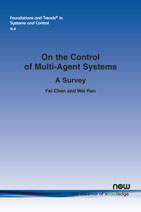On the Control of Multi-Agent Systems: A Survey
Fei Chen, State Key Laboratory of Synthetical Automation for Process Industries Northeastern University and School of Control Engineering Northeastern University at Qinhuangdao, China, fei.chen@ieee.org , Wei Ren, Department of Electrical and Computer Engineering University of California, Riverside, USA, ren@ee.ucr.eduAbstract
Recent years have witnessed a trend to use networked multiple autonomous agents to accomplish complex tasks arising from space-based applications, smart grids, and machine learning. Such systems are referred to as multi-agent systems, where a global objective is achieved via the local interactions among the agents. The recent two decades have witnessed a rapid development of MASs in automatic control, but their root can be traced back much earlier. This paper reviews the research progress of MASs in past years. After briefly introducing the basic concepts and definitions, we discuss agents’ dynamic models, including both linear and nonlinear models, describe different cooperating tasks, such as consensus, coordinating tracking, formation control, distributed average tracking, distributed estimation, containment control, surrounding control, and distributed optimization. We introduce various research issues for MASs, including time-delays, noise or disturbance, quantization, connectivity maintenance, and event-triggered control. We present different MAS control algorithms, including proportional control, proportionalintegral control, adaptive control, model predictive control, passivity-based control, and nonsmooth control, and their applications in multi-robot systems, sensor networks, smart grid, machine learning, social networks, and many-core microprocessors.
On the Control of Multi-Agent Systems: A Survey
Multi-Agent Systems (MAS) use networked multiple autonomous agents to accomplish complex tasks in areas such as space-based applications, smart grids, and machine learning. The overall system goal is achieved using local interactions among the agents. The last two decades have witnessed rapid development of MASs in automatic control.
Tracing the roots of such systems back more than 50 years, this monograph provides the reader with an in-depth and comprehensive survey of the research in Multi-Agent Systems. The focus is on the research conducted in the two decades. It introduces the basic concepts and definitions to the reader before going on to describe how MAS has been used in most forms of systems.
The monograph offers a concise reference for understanding the use of MASs and the contemporary research issues for further investigation. In addition to covering the basic theory, the authors also cover applications in multi-robot systems, sensor networks, smart grid, machine learning, social networks, and many-core microprocessors.
On the Control of Multi-Agent Systems provides researchers and students in systems and control a modern, comprehensive survey of one of the most important current day topics.
